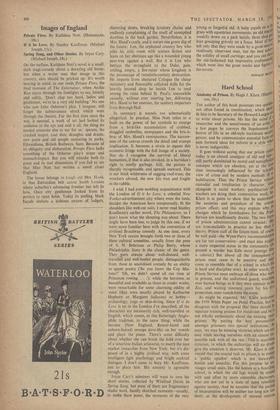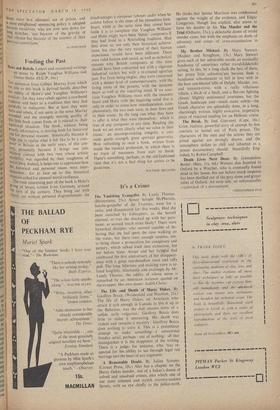• Hard School
THE author of this book possesses two qua not often found in combination, which We'll fit him to be Secretary of the Howard Leaguelitila to write about prisons. He has the mind 01,., researcher and the sensitiveness of an artist. il'd a few pages he conveys the hopelessness an tv horror of life in an old-style maximum see° 'd prison; and he communicates essential facts an puts forward ideas for reform in a style whIcil is never indigestible. It goes without saying that our prison sysle! today is an absurd amalgam of old and 01 still partly dominated by moral and metaphYsicae concepts which are obsolete, yet at the sad time increasingly influenced by the scierill view of crime and by modern methods of re: habilitation. Thus the Prison Service relraT' custodial and totalitarian in character, wilt alongside it social workers, psychiatrists and teachers are doing their constructive work. Mtf. Klare is at pains to show that he understaflu; the anxieties and prejudices of the average prison officer, and this may explain why tbe changes which he foreshadows for' the Prisitn Service are insufficiently drastic. The two forms of prison administration cannot co.-exist: tile,)' are irreconcilable in practice no less than In theory. PriSon staff of the future must, of course. be well paid—the Wynn-Parry recommendation' are far too conservative—and must also acciuir a more respected status in the community,(Ptt present a warder has little more prestige 0'3,,'; a convict.) But above all the atmosphere o' prison must cease to be punitive and 10,51 come to resemble that of a school in which li'`. is hard and discipline strict. In other words. ill Prison Service must embrace all those who %or'. in prisons, and the uniformed guard, watclii° over human beings as-if they were animals in the Zoo, and waiting nineteen years for his fir't promotion, must vanish from the scene. As might be expected, Mr. Klre welcomes 1 the 1959 White Paper on Penal Practice, but he disagrees with the proposal that there should be separate training prisons for recidivists and he is not wholly enthusiastic about the existing open prisons. 'By putting the best personalities amongst prisoners into special institutions.' be says, 'we may be winning victories which are Ca easy while leaving ourselves with an almost stn' possible task with all the rest.'-3his is searching criticism, to which the authorities will no doubt give the attention it deserves. Mr. Klare is eon' vinced that the crucial task in prison is to create a 'public opinron' which is not inexorablY hostile and anarchic. For this purpose he en' visages small units, like the houses" ata boarding school, in which the old lags would be mixed with and offset by more amenable characters. who are not yet in a state of open rebellion against society. And he assumes that the period of incarceration will be neither too long nor too short, as the development of remand centres keeps more first offender's out of prison, and a more enlightened sentencing policy is adopted Sowards recidivists. who are now sent down for long stretches, 'not because of the gravity of their offence but because of the number of their Previous convictions.'
AL] RINCIIAM



































 Previous page
Previous page